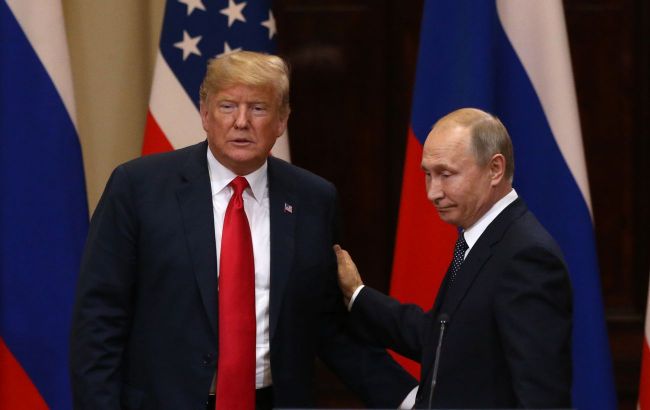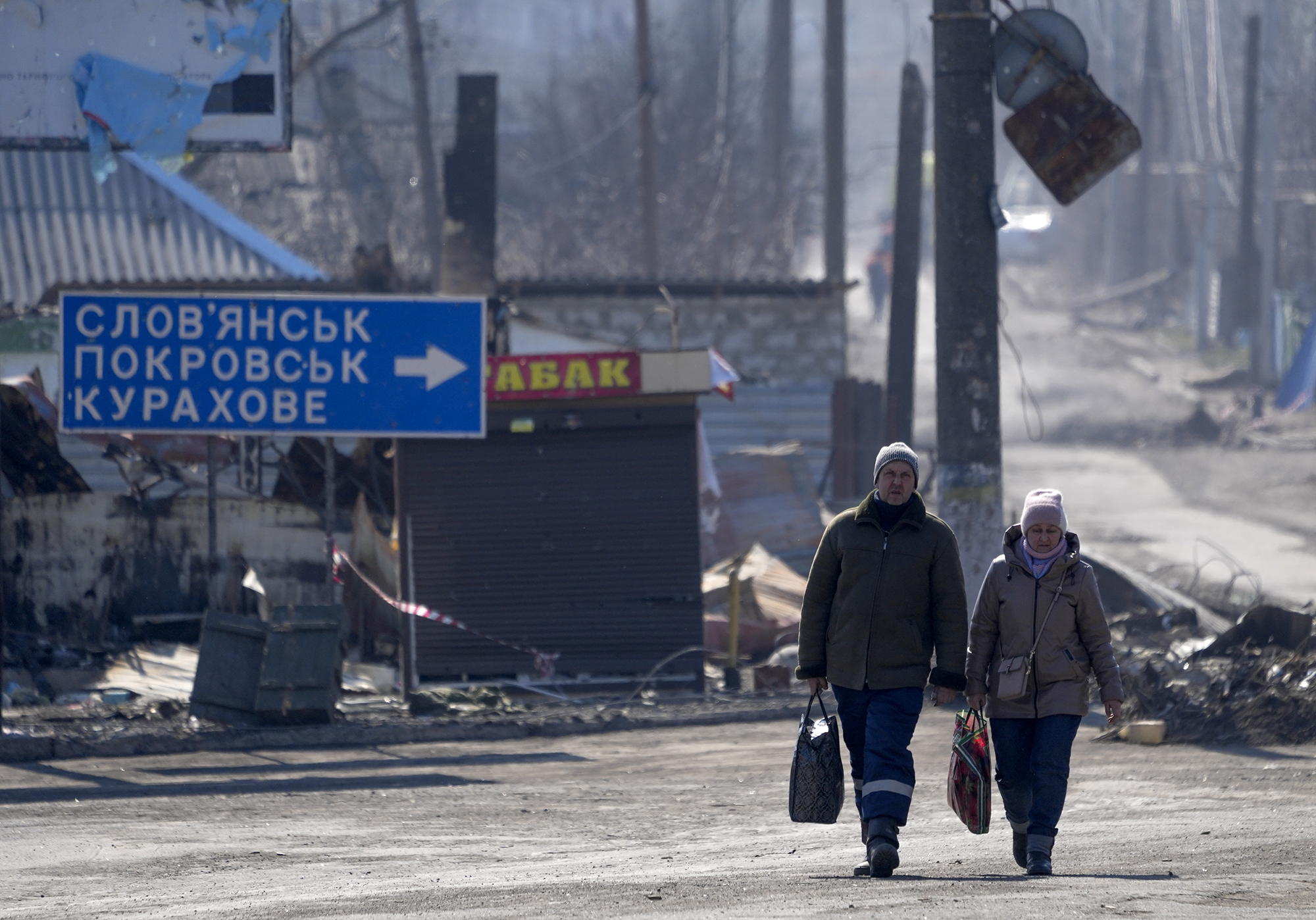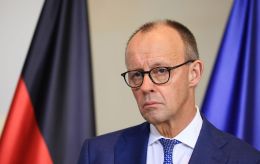Putin plays his game while Trump stays silent - What Russia's planning against Ukraine
 Putin is preparing for an offensive in the summer, although he pretends to be ready to end the war (photo: GettyImages)
Putin is preparing for an offensive in the summer, although he pretends to be ready to end the war (photo: GettyImages)
The talks between Ukraine and Russia in Istanbul and Putin's subsequent statements do not show that Moscow is ready to end the war. At the same time, Trump is still not going to impose new sanctions against it, as he threatened to do earlier. What game Putin is playing, what he is planning at the front, and why the US is not reacting to it, read in RBC-Ukraine's article.
Key questions
- Is Putin ready to cease fire and hostilities?
- On which frontline areas will Russia focus this summer?
- What other sanctions may the US impose on Russia?
- Why is Trump still not acting tough against Putin?
- How is the Kremlin trying to buy the White House's loyalty?
Despite the loud promises of Donald Trump's team to end the war quickly, its end is still not in sight in the foreseeable future. The White House's proposal and Ukraine's agreement to start with a 30-day ceasefire at the front was rejected by Putin, not directly, of course, but in fact.
In the same way, the Kremlin veiledly rejected the so-called US peace plan, which included the legal recognition of occupied Crimea as Russian and other benefits for Moscow.
Putin also made his move, initiating direct talks with Ukraine in Istanbul. However, they ended almost without result, except for the possibility of a large-scale exchange. And although the Ukrainian and Russian delegations agreed to prepare for the next meeting, Moscow is simultaneously preparing for another offensive campaign at the front.
All of these factors and facts combined did not force the Trump administration to take decisive action against Russia. Moreover, many recent publications in the Western media and statements by Trump himself raise doubts as to whether he has decided to abandon the negotiation process he had insisted on.
What Putin is up to: Scenarios
Despite his demonstrative willingness to negotiate, Putin's behavior, rhetoric, and actions suggest a more complex game. The first scenario is that the Kremlin does not want to end the war at all, because Putin sees its continuation as the only way to preserve his regime. And by agreeing to negotiate, he is only trying to create the illusion of constructiveness for Trump so as not to quarrel with him by directly refusing to do so.
At the same time, Moscow's calculation may be that the White House will eventually lose interest in the Russian-Ukrainian war due to the lack of progress in the peace process and will gradually switch to other issues. This version is countered by the fact that in such a scenario, Putin completely ignores his ability to continue fighting and the internal risks - economic, social, and mobilization - that increase with the war's duration.
 The Istanbul talks did not result in a ceasefire (photo: Getty Images)
The Istanbul talks did not result in a ceasefire (photo: Getty Images)
The second scenario is that Putin, under pressure from the West, will only agree to a temporary truce, but will use it only to prepare for the next offensive and to ease sanctions pressure. The threat of this scenario is that the West may mistake this for the beginning of de-escalation and weaken its support for Ukraine. However, Ukraine could also use this pause. On the contrary, the West could accelerate defense assistance and react even more harshly after Russia violates the ceasefire.
The third scenario assumes that Putin is ready to end the war. However, he is now deliberately setting maximalist conditions in advance to bargain for something less that will also satisfy him. It's worth mentioning that in Istanbul, Medinsky demanded that Ukraine withdraw its troops from the territories that Russia does not control at all to cease fire.
And this is also classic Kremlin diplomacy: first, make a maximum demand, and then meet it halfway by winning concessions. This version is contradicted by the fact that there are currently no signs that would demonstrate Putin's willingness to compromise beyond words. On the contrary, he has announced plans to create a buffer zone on the border with Ukraine.
Therefore, the fourth scenario seems more likely - Putin is still ready to end the war only on his maximalist demands, which he is stating now. Since he realizes that Ukraine will not agree to them now, he wants to bring these conditions to the frontline as close as possible by continuing the offensive campaign in the summer. At the same time, this should further exhaust the Ukrainian army and civilians, making them more compliant with Moscow's demands. And the recent start of negotiations in Istanbul is just a cover for the West and a way to stall.
By the same token, the Kremlin does not agree to a ceasefire until some points of the ceasefire agreement are agreed upon, to reinforce diplomatic pressure on the military.
What Russia is planning at front
It seems that Putin is still convinced that his army is doing well at the front, and that he can easily outlast Ukraine in a war of attrition. According to RBC-Ukraine, in 2025, the Russians plan to recruit approximately 343,000 people for contract service. This replenishment, even taking into account the current losses of the occupation army, will allow it to maintain the current intensity of hostilities at least until the end of the year. The Russians have serious problems with armored vehicles, but they have been able to replace them everywhere with motorcycles, ATVs, and buggies.
Several informed sources in the Ukrainian Defense Forces confirm this: Moscow has already set priorities for the summer and fall campaign and has no plans to curtail hostilities.
According to RBC-Ukraine's sources, during the summer and fall offensive campaign, Russia plans to focus its main efforts on two strategic objectives. The first is to capture the entire territory of the Luhansk and Donetsk regions within their administrative boundaries. The second task is to create a so-called buffer zone 15-20 kilometers deep, primarily in Sumy and Kharkiv regions.
"In case of success in these areas, Russia plans further offensive actions to seize new territories in Zaporizhzhia and Kherson regions," one of the interlocutors said.
These estimates are confirmed by the forecasts of the American Institute for the Study of War. Angelica Evans, a Russia analyst at the ISW, believes that Russia's offensive operations in the summer will be focused on Pokrovsk, Kostiantynivka, and Novopavlivka. She noted that over the past five months, the Russians have redeployed several units from the areas of Velyka Novosilka and Orikhiv to the Pokrovsk-Kostiantynivka area. This may indicate an intention to strengthen these areas before the next phase of active hostilities.
"As the Russians continue offensive operations this summer, we expect them to continue to prioritize the Pokrovsk, Kostyantynivka, and Novopavlivka directions. The Russians have redeployed several units from the Velyka Novosilka and Orikhiv areas to the Pokrovsk-Kostyantynivka area over the last five months, suggesting that they are trying to reinforce these areas, possibly ahead of an intensified push here. Russian forces have been advancing towards Pokrovsk and setting conditions to envelop the town for over a year and may reintensify this effort in Summer 2025. Russian forces have also recently conducted a few assaults in southern Belgorod region that indicate that Russian forces may be trying to expand their salient in northern Kharkiv region. Russian forces have not made significant advances in the Kharkiv direction in almost a year and may intend to intensify efforts here, but it is unlikely to be their priority direction this summer," Evans told RBC-Ukraine.
At the same time, the agency's interlocutors in the Ukrainian Defense Forces predict that Putin will not be able to significantly strengthen his positions on the battlefield during the summer and fall campaigns. They consider Russia's ability to reach the administrative boundaries of Donetsk, Zaporizhzhia, and Kherson regions or to completely capture one of them by the end of this summer or even by the end of the year unrealistic.
The same opinion is shared by ISW. According to Evans, since the beginning of 2022, the Russian army has not demonstrated the ability to conduct rapid mechanized maneuvers necessary for the rapid seizure of large areas. At the same time, the capture of the entire Donetsk region alone at the current pace would be a multi-year campaign.
"Russian President Vladimir Putin's current theory of victory, premised on slow, highly attritional infantry advances, seems to have allowed the Russian military command to be content with only advancing 1-2 kilometers per day at significant personnel losses. We are unlikely to see any significant shift in Russian battlefield tactics or capabilities that would significantly alter Russia's ability to conduct deep penetrations and seize large swathes of territory in the near term," the Institute for the Study of War said.
 Russia wants to focus its summer campaign on seizing territory in the Donetsk region (photo: GettyImages)
Russia wants to focus its summer campaign on seizing territory in the Donetsk region (photo: GettyImages)
According to Evans, Russian troops may also try to enter the Dnipro region in the coming weeks or months. Its administrative border is about three kilometers away from the nearest Russian positions (near Novopavlivka and Velyka Novosilka), although the Russian troops have been there for several months and have not been able to break through.
"Russian forces may cross into the easternmost Dnipropetrovsk region in the coming weeks and months, but Russian gains in the Dnipropetrovsk region will likely be just as slow and grinding as in Donetsk region, so long as Ukrainian forces maintain similar defensive and drone capabilities in these areas. Russian officials will likely attempt to overinflate the battlefield significance of advances into the Dnipropetrovsk region, however, and may even use limited advances into the Dnipropetrovsk region to justify demands for additional Ukrainian territorial concessions in future peace negotiations," the ISW analyst suggests.
Why Trump is not acting
It is unlikely that Russia's plans are a secret to US intelligence or the White House. Despite this, Trump still has not taken the countermeasures that he threatened and that Europe and Ukraine expected him to take. Washington still has a set of tools to increase the cost of war for Russia.
These include toughening energy sanctions, including increasing sanctions against Russia's shadow fleet, restricting the sale of its oil through intermediaries, or imposing high duties on those who buy oil or gas from Moscow. This idea is currently being promoted by a bipartisan group of senators led by Lindsey Graham.
In addition, Russia could be further hurt by completely disconnecting its banks from SWIFT and imposing secondary sanctions on third-country companies that help it circumvent sanctions. In addition, the sanctions already imposed have not greatly affected Rosatom, Gazprombank, the Russian IT, gold and diamond, and space industries.
However, Trump's inconsistent actions and contradictory statements, on the contrary, offset the Kremlin's fear that the United States will use these tools at all. Here, too, there are several versions and explanations for his behavior. One is a simplistic vision of the path to peace, in which everything is measured in terms of deals and bargaining, and ignoring classical diplomacy. The second is that Trump doesn't want to put too much pressure on Russia so as not to push it further into the arms of China, which the United States sees as an even greater threat.
There is another version, which was given in a conversation with RBC-Ukraine by political scientist Abbas Gallyamov, who once lived in Russia and was Putin's speechwriter in the late noughties. According to him, Putin does not want to quarrel with Trump, as he is very much afraid of the prospect of new sanctions or increased supplies of American weapons to Ukraine. Therefore, in his opinion, Moscow could simply buy the loyalty of the new White House team.
 Trump's envoy Witkoff could have traveled to Putin to coordinate joint business projects between the US and Russia (photo: GettyImages)
Trump's envoy Witkoff could have traveled to Putin to coordinate joint business projects between the US and Russia (photo: GettyImages)
"According to a leak from the Kremlin apparatus, at least three major US-Russian projects have already been agreed upon and are at a high stage of readiness following meetings and conversations between Kirill Dmitriev and Steve Witkoff. A fairly wide range of people are involved in them, and they are involved in preparing and working out the details of these projects," Gallamov says.
The first is the trade of Russian gas in Europe. The idea, according to Gallyamov, is that the United States will buy gas on the Russian exchange at a domestic price, send it through its pipelines to Europe, and sell it there at a European price.
"But the gas will be considered American gas because they bought it. And all the profits go to the Americans. It is said that Chevron has been approved as the operator of this project. The second project concerns three oil refineries located in Germany, in which Rosneft owns shares. Allegedly, its stakes are planned to be transferred to the same Chevron at an extremely favorable price," the source added.
The third project concerns Vostok Oil, which was once launched by Rosneft to produce oil and gas condensates in the Taymyr Peninsula in the Krasnoyarsk Krai. As Gallyamov explained, cooperation on this topic involves the supply of oil equipment from Chevron, Halliburton, and several other smaller American companies. Russia, in turn, will pay them in crude oil, which will be supplied to world markets as American oil. The so-called exchange rate will also be extremely favorable for the Americans, the source said.
Many more projects are the subject of negotiations between Russia and the United States, Gallyamov said. These include mining of rare earth metals, titanium, and gold, and cooperation in the nuclear energy sector.
"They are being prepared by a large number of people in government agencies and state-owned companies - Gazprom, Rosneft, Rosatom, Polyus Gold. Rotenberg and Tokarev from Transneft are also preparing their proposals. All of this goes through the government, among other things, and is eventually collected by the deputy head of the Presidential Administration for Economics, Maxim Oreshkin. And then all of this is sent to Dmitriev, and then to the Americans. Witkoff's last visit to Putin was about this cooperation," Gallyamov says.
This cooperation does not necessarily mean corruption in the literal sense, the source clarifies. However, if these projects are implemented, money will go to American companies. This means additional tax revenues for the US treasury and job creation, all of which Trump promised his voters.
In return, Russia is hoping for Trump's greater flexibility in terms of imposing sanctions or simply bargaining for a delay in the end of hostilities, Gallyamov suggests. After all, it is unlikely that the White House will want to engage in an even greater controlling confrontation with its potential partner when such significant benefits are at stake. This scenario can only be thwarted by a part of Trump's Republican entourage that is still hostile to Russia and not ready for business as usual, Europe, and Ukraine itself.



